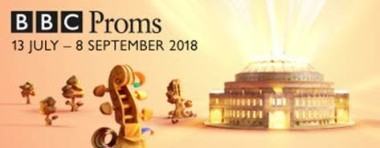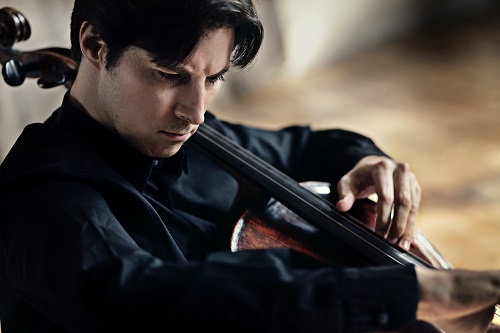
 United Kingdom BBC PROM 24 – Ethel Smyth, Dvořák, Richard Strauss: Daniel Müller-Schott (cello), BBC National Orchestra of Wales / Otto Tausk (conductor), Royal Albert Hall, London, 1.8.2018. (CS)
United Kingdom BBC PROM 24 – Ethel Smyth, Dvořák, Richard Strauss: Daniel Müller-Schott (cello), BBC National Orchestra of Wales / Otto Tausk (conductor), Royal Albert Hall, London, 1.8.2018. (CS)

Dame Ethel Smyth – The Wreckers: ‘On the Cliffs of Cornwall’ (Prelude to Act II)
Antonín Dvořák – Cello Concerto in B minor Op.104
Richard Strauss – Ein Heldenleben Op.40
The heat and holiday breaks were perhaps the reasons behind the few empty seats at this Prom, subtitled ‘A Hero’s Life’. The number of vacant chairs increased after the interval but those who had come to hear soloist Daniel Müller-Schott perform Dvořák’s perennially popular Cello Concerto, and who decided to forgo Richard Strauss’s orchestral paean of self-glorification, missed the best bit of this concert by the BBC National Orchestra of Wales under conductor Otto Tausk, who was making his Proms debut.
In this performance of Ein Heldenleben, the strings may not always have exuded a truly Straussian sheen, horns and brass might have been more exuberant, and some of the tempi may have been a little too temperate. But, Tausk created a strong and sustained sense of narrative – my guest, unfamiliar with the tone poem, needed barely a brief glimpse at the programme so easily was he seduced into the Hero’s amorous and military ups-and-downs. In the initial presentation of The Hero, all instrumental sections enjoyed both the agility and sensuality of the musical motifs that form Strauss’s self-portrait. One couldn’t help but smile at the composer’s chutzpah.
The woodwind’s critics’ cackling was brittle, spiky and hollow, and the muted cello and double bass response was fittingly droopy and dispirited. Leader Lesley Hatfield impersonated Pauline de Ahna, Strauss’s wife, stylishly and with virtuosic security. Arriving on the scene with beguiling surreptitiousness, her coquettish charm was signalled by some telling harp gestures while the dark woodwind and brass chords reverberated with deeper passions; the audacity of her musical courtship would have been difficult to rebuff! And, succumb the Hero did, the harp’s tumbling descents and the full orchestral swells indicating the depth of his intoxication, before the couple seemed to snuggle up in self-satisfied bliss.
The off-stage trumpets – just the right amount of nerviness to their fanfares – rattled our Hero out of complacency though, initiating some orchestral trouble and strife, to which the percussion players added some meaty military might. Tausk managed to make potential mayhem on the battlefield sound ‘all under control’ in the concert hall, as strident insistent woodwind rhythms snarled, the bass end of the orchestral thumped, and the strings whirled and skipped. There may occasionally have been a lack of gleaming polish, but this was playing in technicolour from the BBC NOW. There was no holding anything in reserve, only full commitment to the story-telling. Tausk subsequently cleansed the air, allowing space for oboe, clarinet and solo string lines to restore the peace. The players did not let their concentration slip, though, and the subsequent unrest and resignation were equally compelling. It was hard to suppress a smile as horn and solo violin duetted luxuriantly, as Tausk brought things to a quietly dignified conclusion.
The concert began with the orchestral prelude to Act II of Ethyl Smyth’s The Wreckers – a tragic tale of one villager’s heroic attempts to thwart maritime sabotage and plunder by his fellow Cornishmen, religious fanatics who are egged on by their over-zealous preacher who convinces them that they are serving God’s will. In ‘On the Cliffs of Cornwall’, Smyth employs evocative timbres and a harmonic palette redolent of Debussy to create a coloristic ‘tone-poem’ in which we hear the whooshing of waves and the seagulls’ piercing calls, and sense the power, beauty and menace of the oceanic expanse. A quiet timpani blow, resonating from the deep, triggered an upswell of harp ripples, while the distant booms of ships’ horns were intimated by horns and brass. Tausk used the ebbs and flows of the music to suggest ever-present danger: a gentle harp ostinato could quickly escalate into a jaggedly insistent tritone played by the horns or brass. But there was dignity and grandeur too – the sublime majesty of the soaring cliffs and infinite seas – in the quasi-Wagnerian peaks which Tausk shaped convincingly, before the lapping rhythms became more regular, the triple-time ostinato and quiet oboe bringing the short prelude to a calm conclusion.
The opening of the Allegro of Dvořák’s Cello Concerto felt a little restrained, in terms of both tempo and mood, but Tausk did ratchet up the tension towards the grandiose full orchestral statement of the theme. The horn’s second subject didn’t provide a sufficiently composed counter-part, though; it seemed hesitant, very slightly behind the beat, and while the pianissimo was sweet-toned, the molto espressivo was rather over-looked. The solo cello’s entry re-introduced some focus, Daniel Müller-Schott producing a resolute tone, and confidently and freely shaping the soloist’s exploration of the thematic material. I may be wrong, but with the arrival of the Tempo primo Müller-Schott seemed to want to push forward but was held back, as if someone had their foot ever so slightly on the brake. The cellist took his time over the second theme though, singing with an eloquent tenderness, and the accelerando out of this intimacy proved the springboard for more confident and settled ensemble support in the remainder of the movement, with Tausk aiming for and achieving textual clarity to create pockets of air for the light to shine through. There was lovely sweetness from the woodwind and the strings’ pizzicatos were unwaveringly crisp and taut. The soloist’s string-crossing exploits and double-stops were perfectly tuned and cleanly projected, and as the movement drew to a close, the BBC NOW finally captured the defiant command that had been missing previously.
As the successive movements unfolded, Müller-Schott’s reading became ever more ruminative, and this worked well in the Adagio ma non troppo in which, at the start, the introspective quietude conveyed both peace and anxiety. The woodwind formed a commentary of consolation but the entry of the full orchestra and the rough jolt to the minor tonality seemed designed to draw the soloist from his reverie. Some of the episodes had a flowing momentum, but wistfulness won out in the end, and – as in the passage for four horns and pizzicato cellos and double basses – urgency was ever-present beneath the lyricism. And, I was impressed by the way Steve Barnard quietly made us aware of the role that the timpani plays in underpinning reflections that might otherwise stray into dreamy other-worldliness.
However, the march of the Finale: Allegro moderato didn’t have enough bold edginess for me: we had relaxed high-spirits rather than defiance and an inexorable sense of champing at the bit. I would have liked more variety of tone from Müller-Schott in the various episodes though the cellist’s sound was unfailingly rich and the technical challenges were clearly a breeze. In the extensive unwinding towards the conclusion, Hatfield once again proved a sensitive partner in duet, but by the long final reflective epilogue, Müller-Schott was ever more withdrawn, as if he were being marched increasingly far into the emotional hinterlands. And, the retreat into spiritual interiority continued in the encore, Ernest Bloch’s ‘Prayer’, the first of the composer’s three pieces From Jewish Life.
Claire Seymour